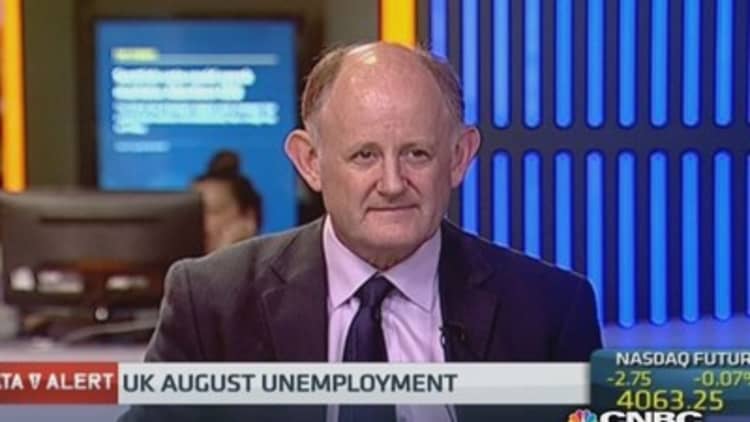
The U.K.'s jobless rate fell to a near six-year low on Wednesday to levels not seen since the beginning of the global financial crash of 2008, according to official data.
The unemployment rate for the three months between May and the end of July hit 6.2 percent, compared to 6.4 percent in the three-month period through to the end of June, figures from the Office for National Statistics (ONS). This was lower than expectations in a Reuters poll of 6.3 percent and was the lowest seen since the September-November period of 2008, the months which saw the Lehman bankruptcy and the resulting crash.
The number of people claiming unemployment benefits also fell and dipped below the 1.0 million mark for the first time since September 2008. Howard Archer, an economist at IHS Global Insight, called it a "robust set of labor market data."
The U.K. pound had risen to a one-week high ahead of the release but fell lower after the news to trade at around 1.629 against the dollar.
Meanwhile, the minutes from the Bank of England's Monetary Policy Committee's latest meeting showed that members were still split 7 to 2 against an immediate rate hike.
Read MoreBoE's Carney: Rate hike nearing, wage growth weak
Martin Weale and Ian McCafferty, known as the most hawkish members of the committee, both voted in favor of raising rates by 25 basis points at the August meeting and did so again this month.
Economists are expecting a move by the Bank at some point in the first half of next year. Stellar data in the country for the last two years has meant that it is officially one of the fastest growing economies in the G-7 group of industrialized nations.
However, there are clear signs that the U.K. hasn't reached "escape velocity" which has left governor Mark Carney and most of his colleagues more eager to hold off and continue to monitor the situation.
Read MoreKnife-edge Scottish vote cuts deep divide
Carney spoke to an audience of trade unionists this month, saying that that the "exceptional" employment performance has come at the cost of salary increases. He explained that although one million more people are in work than at the start of the crisis in 2008, wages had fallen by 10 percent in the same period.
The ONS confirmed on Wednesday that pay including bonuses for employees in the U.K. was 0.6 percent higher than a year earlier between May and July. The yearly figure for July - excluding bonuses - came in at 0.7 percent. Meanwhile, consumer price data on Tuesday showed a 1.5 percent rise year-on-year in August, down from the 1.6 percent increase in July. Taken as a whole this means that inflation is still running higher than pay increases so real wages are still in the negative.
"Only a modest increase in earnings growth from very low levels suggests that there is still an appreciable amount of labor market slack with little pressure on inflation coming from pay. This is likely to stay the Bank of England's hand on interest rates until early February 2015 at least," said Archer in a research note on Wednesday.
Read MoreUK productivity 'abysmal'—but economy growing well
Nonetheless, Carney has signaled that the moment for rising rates is nearing. At the annual Trades Union Congress (TUC) in Liverpool on September 9 he said that if the Bank began raising rates in spring 2015, inflation would settle at around 2 percent and a further 1.2 million jobs would be created.
"With many of the conditions for the economy to normalize now met, the point at which interest rates also begin to normalize is getting closer," he said, adding that the precise timing would depend on the data and would be gradual and limited.
Follow us on Twitter: @CNBCWorld


